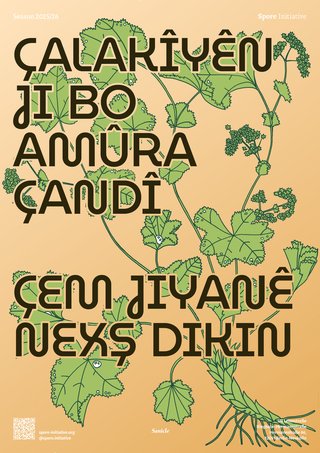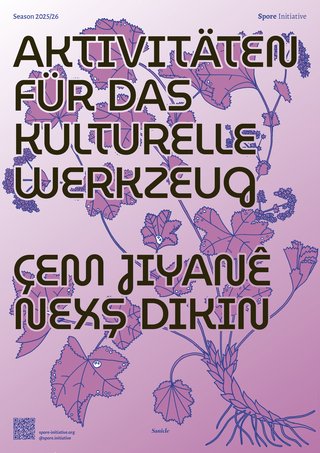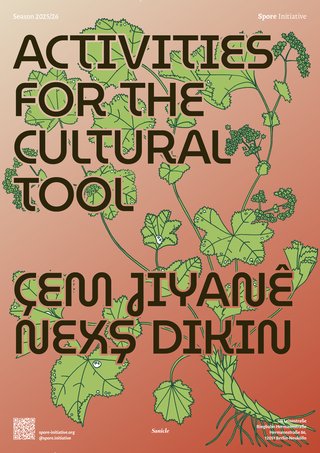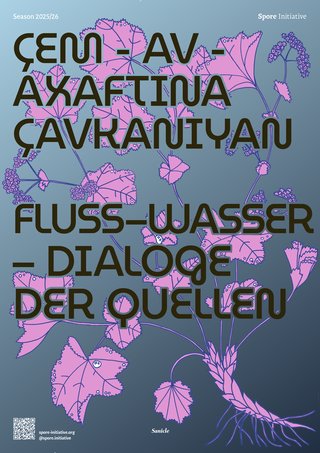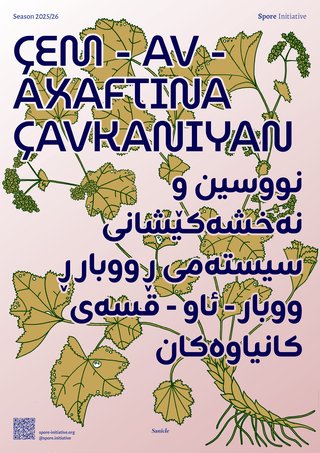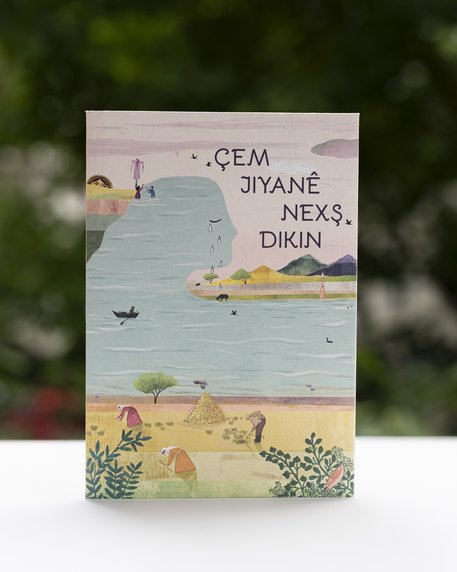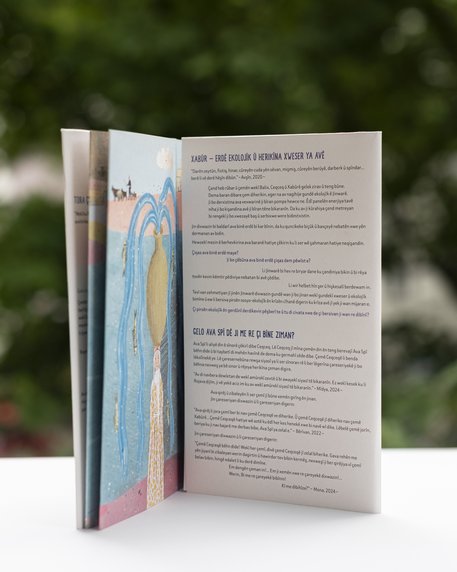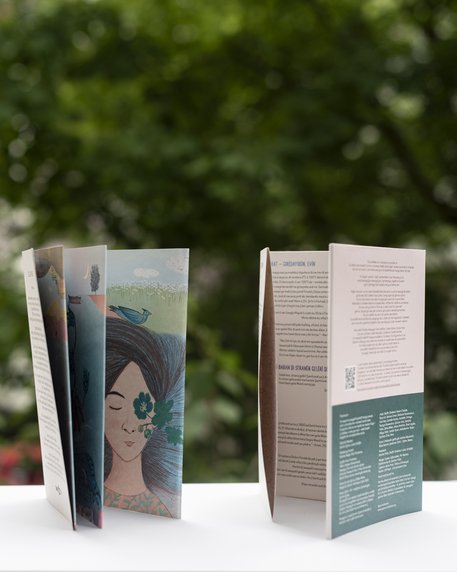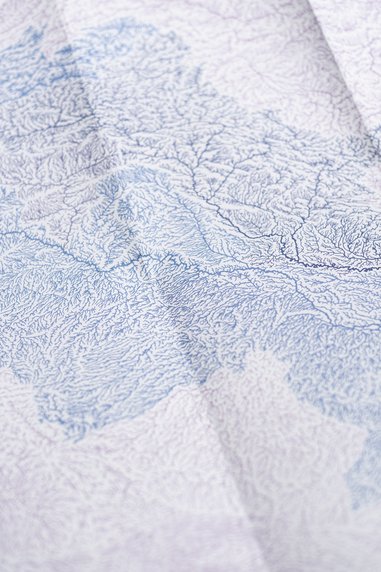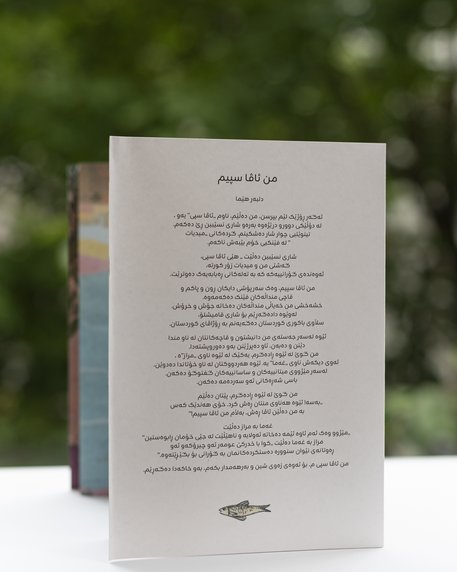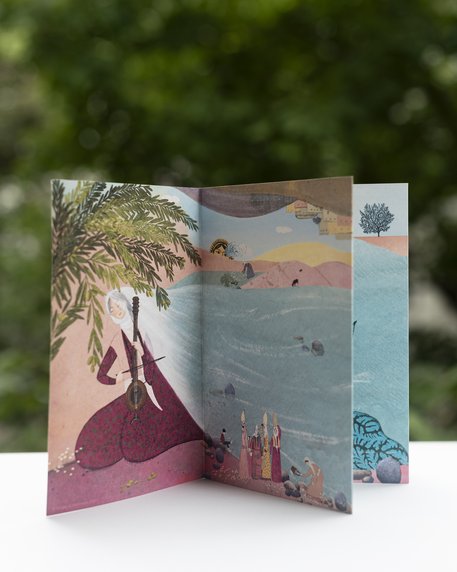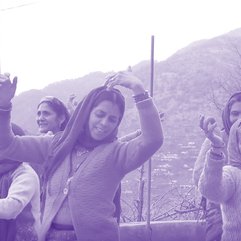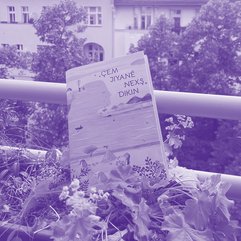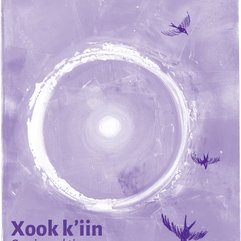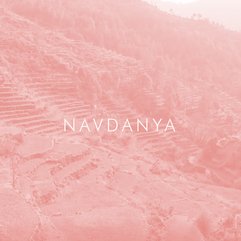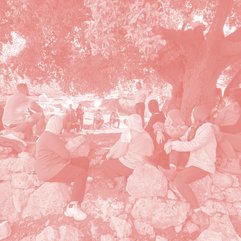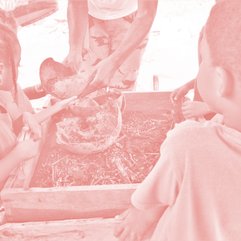ÇEM JİYANÊ NEXŞ DİKİN
This book is a tool for actively experiencing water, listening to it and immersing yourself in its knowledge. Are you involved in educational work, would you like to listen to water with your family, or are you committed to the water bodies in your area?
Then this book is for you.
We are tracing the stories and people, whom the river encounters along the way–especially the narratives and the knowledge of Kurdish women. A dialogue has emerged between anthropologist Şermin Güven and Spore, which, drop by drop, conversation by conversation, has created a river out of the diaspora on the Spree that connects with the water network of Mesopotamia. The river facilitated an exchange of knowledge, care and imagination, as well as cultural and ecological practices—taking on the form of this publication.
It's not just a book to read, but a book to activate, take with you, and share.
It's about becoming more aware of water—and the water stress of the creatures that depend on it.
If you are interested in the book, please contact Lotta Schäfer: lotta.s@spore-initiative.org
To learn more about the WASSERSPIEGEL – WATER BODIES project that inspired this publication
follow the link and also get to know the ALONG THE RIVERS OF KURDISTAN event series.
It's not just a book to read, but a book to activate, take with you, and share. It's about becoming
more aware of water—and the water stress of the creatures that depend on it.
The main contributors to this publication are:
— Şermin Güven with her text, Çem – Av – Axaftina Çavkaniyan, which is full of contributions in particular from women sharing cultural and ecological knowledges from and for the Kurdish communities.
— Narges Mohammadi, an Illustrator based in Teheran with Kurdish ancestry, who contributed an incredibly rich visual story about the river and its connection to women and life.
— Dîlber Hêma with her poem Ez Ava Spî me, which was originally recorded to be listened to in the Wasserspiegel - Water Bodies exhibition here in Berlin. The poem can be read in Kurmanci and Sorani.
Other contributions to the process are manyfold:
From conversations with Şermin Güven that turned into quotes, to ideas for activations of the book, which accompany the tool online, to caring for words, meanings and translations in Kurmanci and Sorani, to adding ecological knowledges into texts and processes, to most importantly the acts of solidarity and staying with the water.
We would like to thank everyone involved for their contributions and diligence.
Contributors:
Şermîn Güven, Narges Mohammadi, Dîlber Hêma, Lotta Schäfer, Mariela Nagle, Rita Fürstenau, Mihraban Salih, Avşîn, Berfîn Emektar, Hesen Chalak, Bisar Icli, Berivan Omar, Delband Rawanduzi, Kanî Heji, Zarokên Xanke, Zarokên Urmiye, Rastyar Rawanduzi, Gülizar Ana, Semiha Yildiz, Şêrko Bêkes, Mona Ibrahim, Emel Aydin, Mîdya Stêrk, Cemîle Yasar, Sozdar Jafarzadeh, Flê Mereto, Hero
In the water stories and radio programs, not only information about the water crisis is exposed, but also personal experiences are shared, cultural symbols are explained, old stories are retold, and history is sung in songs.
New voices were added throughout the year in the WASSERSPIEGEL – WATER BODIES exhibition between April 2024 and February 2025.
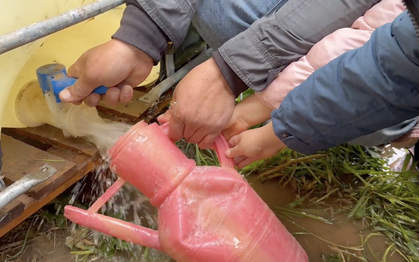

Workshop for children on rainwater harvesting with Bişar İçli.
„The workshop was about the importance of water, why wasting water is harmful to the children and how one can use rainwater and excess water for agriculture. How can they safe unnecessary water at home for instance for plant irrigation.“

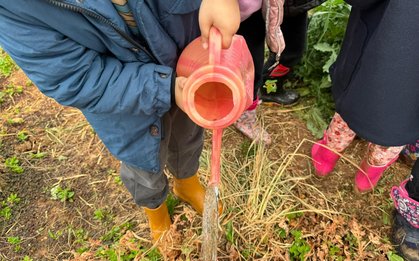
“Our initiative RoJir Agroecology Life Farm, which I am working to on the outskirts of the city Diyarbakır, was imagined as a family commune engaged in subsistence farming with the aim of spreading the principles and ideas of agroecology to the neighboring peasants and farmers and to create solidarity. Our main aim is to revitalize and re-introduce traditional technics of agriculture and seed protection. For example, we started with building local seed archive of the region and then try to cultivate them in a traditional way and with the ethics of agroecology.”

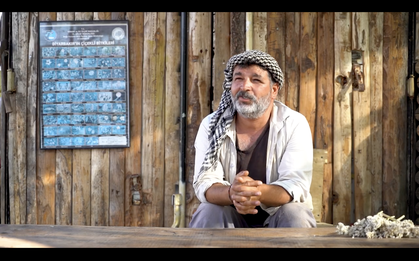
Click on this Link to see a video about the farm.
For more info about the farm click here.

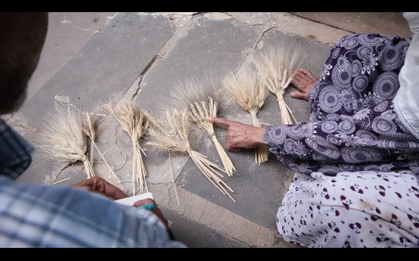

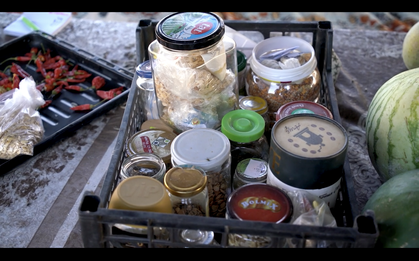
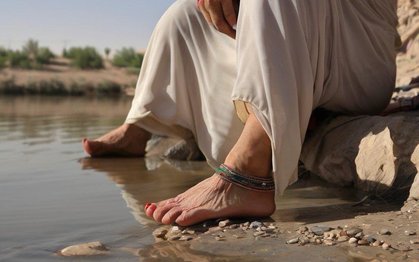

Women Platform for Ecology and Faculty of Jineology at Rojava University
“We formed a group of women from different faculties and walks of life to inquire about the status of our river JaqJaq together. We filmed and collected the perspectives of affected people on the contamination and potential solutions. As a river, JaqJaq has never been taken more seriously than through the Along the Rivers of Kurdistan project.“
“We organized “The steps of women along the rivers of Kurdistan”, a symposium on water awareness, to address the burden of the water crisis for women in particular. Contributors and participants ranged from university students to the water authority and the agricultural office, to members of Jineology committees and Jinwar, NGOs and housewives who all actively participated in the discussion.“
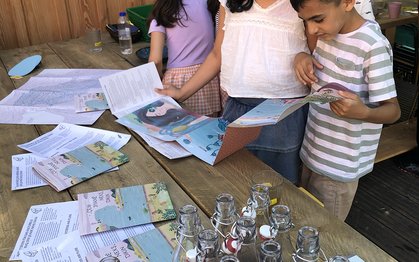

Several activities related to the topic of water have emerged from the long-term collaboration with the Kita Piya and Yekmal e.V.

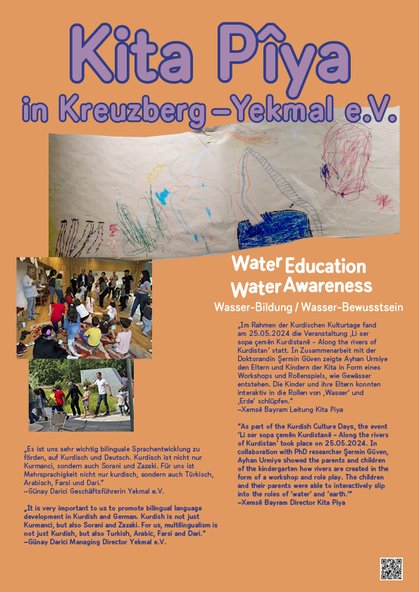 Wasserspiegel – Water Bodies exhibition poster
Wasserspiegel – Water Bodies exhibition poster“As part of the Kurdish Culture Days, the event ‘Li ser sopa çemên Kurdistanê - Along the rivers of Kurdistan’ took place on 25.05.2024. In collaboration with PhD researcher Şermin Güven, Ayhan Urmiye showed the parents and children of the kindergarten how rivers are created in the form of a workshop and role play. The children
and their parents were able to interactively slip into the roles of ‘water’ and ‘earth.’”
– Xemsê Bayram Director Kita Piya and Yekmal e.V.

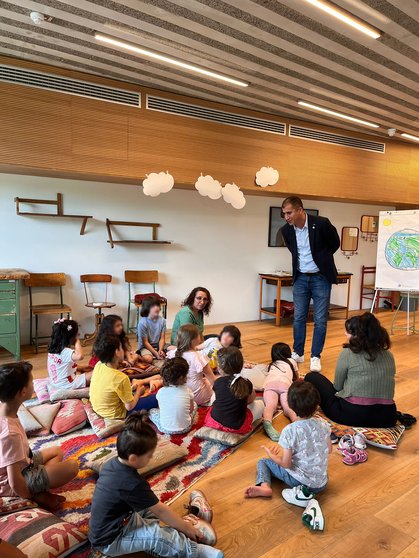
The teachers at the Kita Piya continued working with the children on the collection of water words. They cut out raindrops and each child contributed a word. In September 2024, their work was presented as part of the exhibition Wasserspiegel – Water Bodies.

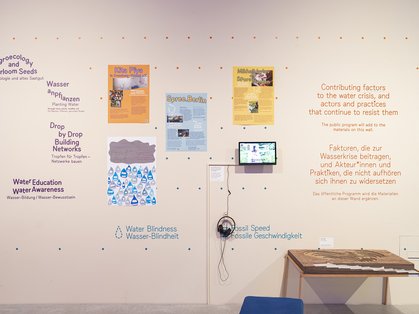 Exhibition view of the exhibition Wasserspiegel – Water Bodies
Exhibition view of the exhibition Wasserspiegel – Water BodiesThe collection of water words was also featured in the interactive book ÇEM JİYANÊ NEXŞ DİKİN, which we activated in a workshop together with the kindergarten Piya and other children and adults in the garden of the Spore Initiative at the end of August.
The activities are an opportunity for everyone to be inspired and put together their own workshop. For this workshop, Şermin Güven, João Albertini and Lotta Schäfer tried out the following exercises:
1. In a circle, we worked out the elements of the water cycle together and imitated them with our bodies. Then we acted out the water cycle together.
2. “Telling and Listening” – Each group was given one page of Narges Mohammadi's illustrations and came up with a story together. Afterwards, the stories were presented and combined to form a single stream of narration.
3. “Tasting/Making it Precious” – The Wasserkostbar by Kids Floating Berlin was already experienced at the exhibition opening in April 2024. Once again, it was clear how much enthusiasm and creativity this task inspires, especially in children.
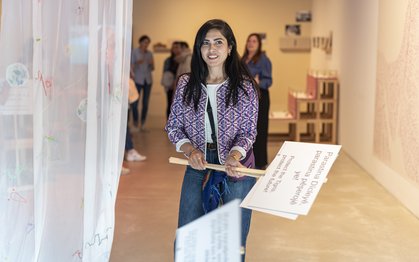

We started collecting stories about water, about rain, about the rivers of Kurdistan. The more word got out, the more people approached us with their water stories. If you give the stories space to be heard - they become sources. We begin with stories because in Kurdistan most of the cultural information was transmitted through ballads, fairy tales, poems and oral stories. The written ones came later. Much more, also for us as the younger generation, comes from stories told by our mothers, aunts and grandmothers.”
Kurdish social and cultural anthropologist Şermin Güven talks about the Along the Rivers of Kurdistan project in a radio broadcast produced in collaboration with her, curator Lotta Schäfer, and Markus Stein from Cashmere Radio about the exhibition project Wasserspiegel – Water Bodies as background to the collaborative process.
In the exhibition space, visitors could listen to the water stories in the original Kurdish language, as well as in German and English translations. You can listen to the stories here. The interviews were conducted as part of social and ecological community work and Şermin Güven's ethnographic project with people from various Kurdish regions and the diaspora.

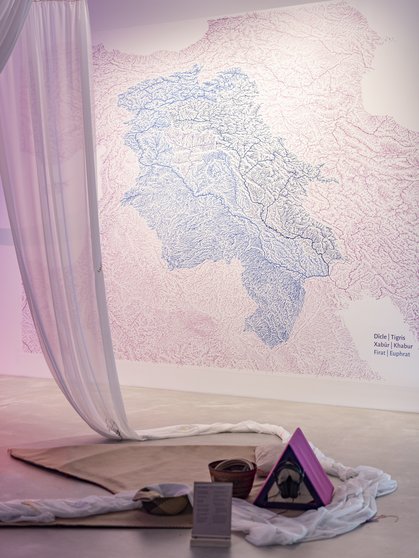 Exhibition view from the exhibition Wasserspiegel – Water Bodies
Exhibition view from the exhibition Wasserspiegel – Water BodiesThe direct witnesses to survival in the water crisis were supplemented with her ecological research work on the various dimensions of water scarcity, for example with the map of the Euphrates and Tigris river network and satellite images of the drought in Rojava and the flooding in Hasankeyf.

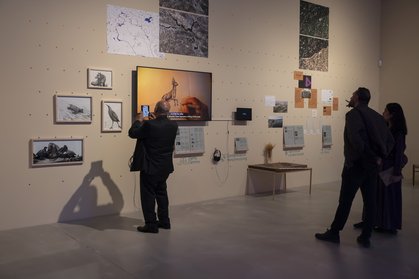 Satellite images on the Info wall about the water crisis.
Satellite images on the Info wall about the water crisis.
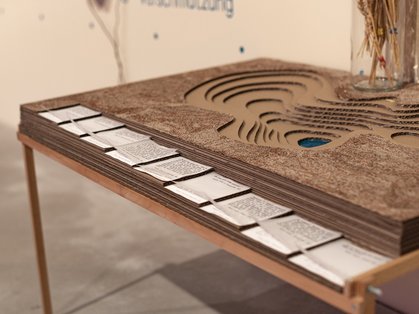 Güven's fountain model with stories about groundwater flows and fountain depths over time.
Güven's fountain model with stories about groundwater flows and fountain depths over time.Şermin Güven has made other rivers visible and audible for the workshops, in film screenings, and discussion events together with people from local communities such as Bişar İçli, Berivan Omer, and the Jineologi Committee Rojava, and in the diaspora with groups such as Ceni, Yekmal e.V., and the Alevi community in the river basin.

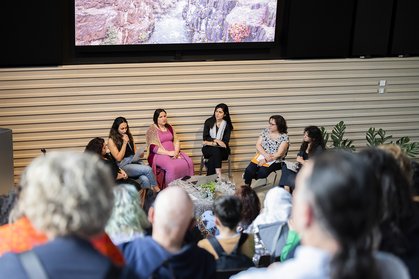 A conversation about the impact of the climate crisis on Kurdish communities
A conversation about the impact of the climate crisis on Kurdish communitiesThe discussion was moderated by Şermin Güven with contributions from Günay Darici (Yekmal e.V.), Ceni e.V., Maviş Güneşer, and Wansa Ismael. Followed by a performance by the Kurdish folk dance group Koma Feraşin.

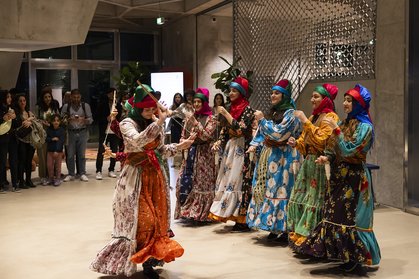

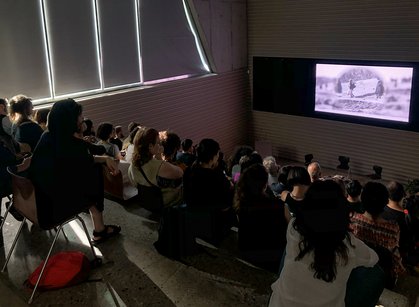 Film Screening of „Khabur“ by Nafis Fathollahzadeh in July 2024
Film Screening of „Khabur“ by Nafis Fathollahzadeh in July 2024For further information about the project, visit the project page at Along the Rivers of Kurdistan.



